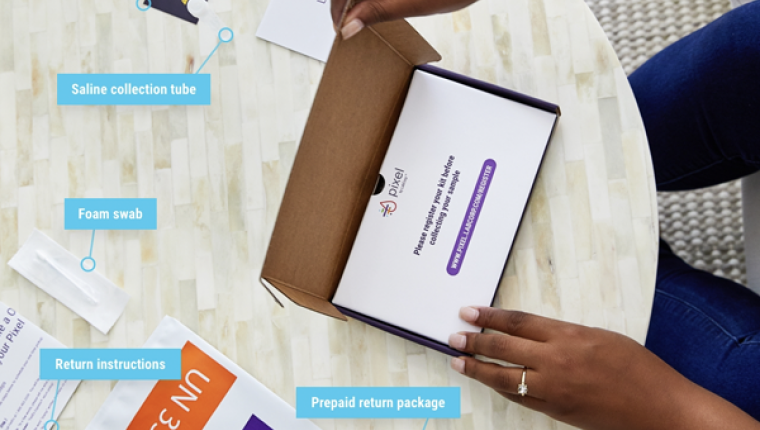If you’re over the age of 45, getting screened for colorectal cancer should be on your to-do list. But let’s be honest, it’s probably not something you’re eager to accomplish.
How an At-Home Test Can Save Your Life
If you’re over the age of 45, getting screened for colorectal cancer should be on your to-do list. But let’s be honest, it’s probably not something you’re eager to accomplish. You’re not alone; one in three American adults (50+) are behind on their colorectal cancer screening.¹
We get the apprehension. Both the prep and procedures for colorectal screening don’t exactly conjure up a feeling of comfort. However, you would be surprised to find the peace of mind that can come from getting screened—besides; you have options.
From traditional in-office procedures to newly emerging at-home collection kits, there is a colorectal screening solution out there that fits your needs as well as your comfort level. Before exploring your choices, let’s start with the basics.
Screening Saves Lives
While colorectal cancer is the second-most common cause of cancer-related deaths in the U.S., its initial slow growth (typically starts as a noncancerous polyp) means that screening can find cancer while it's still curable.2,3 Unfortunately, even fairly advanced colorectal cancers may not produce noticeable symptoms, making screening even more critical.
Age Increases Risk
Of all the colorectal cancer risk factors, age is the most important; 90% of cases are in people over the age of 50.⁴ The American Cancer Society’s colorectal cancer screening guidelines recommend that everyone ages 45-75 get screened.⁵ Older Americans, 76-85 years old, may also benefit from screening and should talk to their physicians to weigh risks and benefits.
Genetics & Lifestyle Matter
Some individuals are at higher risk of developing colorectal cancer due to a personal or family history of colorectal cancer or polyps. Those with genetic polyp syndromes such as Familial Adenomatous Polyposis or Lynch syndrome are also at higher risk.⁴,⁶ Certain lifestyle factors may also increase your chances, such as obesity, alcohol and tobacco use, poor diet, and lack of physical activity.
Screening Options
These days, a colonoscopy isn’t the only option for colorectal cancer screening. There are simple, affordable options, including tests that can be done at home.
At-Home Collection:
Colorectal cancer tumors, and even large polyps, may cause trace bleeding; these can be microscopic and invisible to the naked eye. A variety of stool tests are now available that can replace the need for colonoscopies as a first-line screening option by detecting microscopic blood in the stool.
Two of the most common types are the gFOBT (guaiac-based fecal occult blood test) and the FIT (fecal immunochemical test). These collections can be completed at home and mailed back to a lab, without needing sedation or any preparation for a procedure. These tests are typically repeated yearly.
The Labcorp ColoFIT™ Colon Cancer Home Collection Test is a colorectal cancer screening kit that can be completed at home and mailed back, without the need for a doctor’s visit.
Colonoscopy:
This is the most common screening test. It requires you to undergo “bowel prep,” consuming a prescribed amount of laxative beforehand to clear out your system. While under sedation, you receive an examination of the entire colon and rectum using a video camera attached to a small, slender probe. During the procedure, any polyps discovered can be removed or biopsied.
The most significant advantage of colonoscopies is that they can remove polyps so that they can be examined by a pathologist to determine if they are the type that could turn into cancer or if they are completely benign. If the results are normal, you do not need to receive a colonoscopy again for ten years.¹
C.T. Colonography:
This test requires a similar preparation to the colonoscopy, although the examination of your colon can be performed without sedation. In this procedure, x-rays and computers are used to image the colon, providing a “virtual version” of a colonoscopy. While studies show it is similar to colonoscopy for finding invasive cancer and large polyps, it needs to be done every five years.¹ A disadvantage of the C.T. colonography is that if polyps are identified, they cannot be removed at the time of the examination.
Flexible Sigmoidoscopy:
This test is similar to a colonoscopy, but only examines the rectum and lower third of the colon. It can be done without sedation and in a primary care physician's office. Although it is now less common since colonoscopies have become more widely adopted, it can be combined with a stool test to achieve a similar rate of cancer detection to a colonoscopy. It needs to be repeated every five to ten years.⁷
Colorectal cancer screening has come a long way in the past few decades. With today’s range of options, it is easier than ever to get a screening done in a way that fits your needs. So, don’t wait—check this off the list.
References:
- “Colorectal Cancer Facts & Figures 2017-2019.” American Cancer Society. Atlanta. 2017. https://www.cancer.org/content/dam/cancer-org/research/cancer-facts-and-...
- Stryker SJ, et al. “Natural History of Untreated Colonic Polyps.” Gastroenterology. Nov 1987;93:1009-1013.
- Simon, Stacy. "Facts & Figures 2019: U.S. Cancer Death Rate Has Dropped 27% in 25 Years." American Cancer Society. 8 Jan 2019. https://www.cancer.org/latest-news/facts-and-figures-2019.html
- “What Are the Risk Factors for Colorectal Cancer?” Centers for Disease Control and Prevention. 30 Jan 2019. https://www.cdc.gov/colorectal-cancer/risk-factors/
- Simon, Stacy. “American Cancer Society Updates Colorectal Cancer Screening Guideline.” American Cancer Society. 30 May 2018. https://www.cancer.org/latest-news/american-cancer-society-updates-color...
- Wilkins, T. et al. “Colorectal Cancer Screening and Surveillance in Individuals at Increased Risk.” Am Fam Physician. 15 Jan 2018;97(2):111-116. https://www.aafp.org/pubs/afp/issues/2018/0115/p111.html
- “Colorectal Cancer Screening Tests.” Centers for Disease Control and Prevention. 4 Feb 2019. https://www.cdc.gov/colorectal-cancer/screening/
















